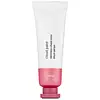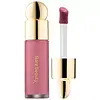What's inside
What's inside
 Key Ingredients
Key Ingredients

No key ingredients
 Benefits
Benefits

 Concerns
Concerns

 Ingredients Side-by-side
Ingredients Side-by-side

Water
Skin ConditioningCyclopentasiloxane
EmollientMethyl Trimethicone
Skin ConditioningMica
Cosmetic ColorantButylene Glycol
HumectantPEG-10 Dimethicone
Skin ConditioningDicaprylyl Carbonate
EmollientNeopentyl Glycol Diheptanoate
EmollientDisteardimonium Hectorite
StabilisingGlycerin
HumectantVinyl Dimethicone/Methicone Silsesquioxane Crosspolymer
Sorbitan Isostearate
EmulsifyingSoluble Collagen
HumectantEthylhexylglycerin
Skin ConditioningMagnesium Sulfate
Dimethicone/Vinyl Dimethicone Crosspolymer
Skin ConditioningMethyl Methacrylate Crosspolymer
Triethoxycaprylylsilane
Disodium EDTA
Polyglyceryl-2 Triisostearate
EmulsifyingPentylene Glycol
Skin ConditioningPhenoxyethanol
PreservativeSilica
AbrasiveAluminum Hydroxide
EmollientTin Oxide
AbrasiveCI 77891
Cosmetic ColorantCI 77492
Cosmetic ColorantCI 75470
Cosmetic ColorantCI 77007
Cosmetic ColorantCI 77742
Cosmetic ColorantCI 15850
Cosmetic ColorantCI 73360
Cosmetic ColorantWater, Cyclopentasiloxane, Methyl Trimethicone, Mica, Butylene Glycol, PEG-10 Dimethicone, Dicaprylyl Carbonate, Neopentyl Glycol Diheptanoate, Disteardimonium Hectorite, Glycerin, Vinyl Dimethicone/Methicone Silsesquioxane Crosspolymer, Sorbitan Isostearate, Soluble Collagen, Ethylhexylglycerin, Magnesium Sulfate, Dimethicone/Vinyl Dimethicone Crosspolymer, Methyl Methacrylate Crosspolymer, Triethoxycaprylylsilane, Disodium EDTA, Polyglyceryl-2 Triisostearate, Pentylene Glycol, Phenoxyethanol, Silica, Aluminum Hydroxide, Tin Oxide, CI 77891, CI 77492, CI 75470, CI 77007, CI 77742, CI 15850, CI 73360
Hydrogenated Polyisobutene
EmollientHydrogenated Poly(C6-14 Olefin)
EmollientMica
Cosmetic ColorantOctyldodecanol
EmollientEthylene/Propylene/Styrene Copolymer
Trimethylsiloxysilicate
EmollientIsododecane
Emollient1,2-Hexanediol
Skin ConditioningDisteardimonium Hectorite
StabilisingSorbitan Sesquioleate
EmulsifyingPropylene Carbonate
SolventTriethoxycaprylylsilane
Aluminum Hydroxide
EmollientHelianthus Annuus Seed Oil
EmollientGardenia Florida Fruit Extract
Skin ConditioningNelumbo Nucifera Flower Extract
Skin ConditioningNymphaea Odorata Root Extract
RefreshingCI 77491
Cosmetic ColorantCI 15850
Cosmetic ColorantCI 15985
Cosmetic ColorantCI 77891
Cosmetic ColorantCI 19140
Cosmetic ColorantCI 45410
Cosmetic ColorantHydrogenated Polyisobutene, Hydrogenated Poly(C6-14 Olefin), Mica, Octyldodecanol, Ethylene/Propylene/Styrene Copolymer, Trimethylsiloxysilicate, Isododecane, 1,2-Hexanediol, Disteardimonium Hectorite, Sorbitan Sesquioleate, Propylene Carbonate, Triethoxycaprylylsilane, Aluminum Hydroxide, Helianthus Annuus Seed Oil, Gardenia Florida Fruit Extract, Nelumbo Nucifera Flower Extract, Nymphaea Odorata Root Extract, CI 77491, CI 15850, CI 15985, CI 77891, CI 19140, CI 45410
 Reviews
Reviews

Ingredients Explained
These ingredients are found in both products.
Ingredients higher up in an ingredient list are typically present in a larger amount.
Aluminum Hydroxide is a form of aluminum. It can be naturally found in nature as the mineral gibbsite. In cosmetics, Aluminum Hydroxide is used as a colorant, pH adjuster, and absorbent.
As a colorant, Aluminum Hydroxide may add opacity, or reduce the transparency. Aluminum hydroxide is contains both basic and acidic properties.
According to manufacturers, this ingredient is an emollient and humectant. This means it helps hydrate the skin.
In medicine, this ingredient is used to help relieve heartburn and help heal ulcers.
There is currently no credible scientific evidence linking aluminum hydroxide in cosmetics to increased cancer risk.
Major health organizations allow the use of aluminum hydroxide in personal care products and have not flagged it as a carcinogenic risk at typical usage levels.
Learn more about Aluminum HydroxideCi 15850 is the pigment color red. It is an azo dye and created synthetically.
Azo dyes need to be thoroughly purified before use. This allows them to be more stable and longer-lasting.
This ingredient is common in foundations, lipsticks, and blushes. This color is described as brown/orangey red.
It has many secondary names such as Red 6 and Red 7. According to a manufacturer, Red 6 usually contains aluminum.
Learn more about CI 15850Ci 77891 is a white pigment from Titanium dioxide. It is naturally found in minerals such as rutile and ilmenite.
It's main function is to add a white color to cosmetics. It can also be mixed with other colors to create different shades.
Ci 77891 is commonly found in sunscreens due to its ability to block UV rays.
Learn more about CI 77891Disteardimonium Hectorite comes from the clay mineral named hectorite. It is used to add thickness to a product.
It can also help stabilize a product by helping to disperse other ingredients.
Hectorite is a rare, white clay mineral.
Learn more about Disteardimonium HectoriteMica is a naturally occurring mineral used to add shimmer and color in cosmetics. It can also help improve the texture of a product or give it an opaque, white/silver color.
Serecite is the name for very fine but ragged grains of mica.
This ingredient is often coated with metal oxides like titanium dioxide. Trace amounts of heavy metals may be found in mica, but these metals are not harmful in our personal products.
Mica has been used since prehistoric times throughout the world. Ancient Egyptian, Indian, Greek, Roman, Aztec, and Chinese civilizations have used mica.
Learn more about MicaTriethoxycaprylylsilane is a silicone used to bind and stabilize ingredients.
As an emulsifier, it helps prevent ingredients from separating. This can help elongate the shelf life of products.
Triethoxycaprylylsilane is often used to coat mineral sunscreens ingredients to help give a better feel. It also helps reduce oxidative stress in sunscreens.
Learn more about Triethoxycaprylylsilane